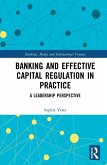The broad consensus before the recent financial crisis was that the so called fair value accounting (FVA) improves transparency contrary to the historical cost model. Since 2008, the discussion has been on the root cause of the crisis, which lessons can be gleaned from it and how making the same mistakes again can be avoided. Basel III was implemented in order to improve the regulatory environment and was the response of regulators and politicians to public pressure and suspicions raised by the bail out programmes for banks. Consequently, an until then inconceivable number of new regulations and regulatory bodies were introduced. FVA was also blamed as part of the cause of the recent financial crisis. Available-for Sales (AfS) securities represent a major component of bank balance sheet asset. Gains and losses of AfS-positions are recorded within the Other Comprehensive Income (OCI). The OCI includes items which are not recognized (IAS 1.7) in income statements but increase or decrease a bank's equity. The items also include income and expenses from Available-for-Sale positions (AfS) in accordance with IAS 39. On October 13th, 2008, an amendment to IAS 39 was published by IASB. This amendment did authorize the reclassification of assets. This amendment clearly demonstrates the influence of FVA on the value of assets of banks that apply IFRS. The main objective of this book is to verify the influence of OCI and whether the new regulations sufficiently capture this critical factor. Regulators should ensure that unrealized profits do not result in a capital drain. One way to assure this is to make OCI subject to a prudential filter and to deduct it from regulatory capital, which was the case until CRR became effective on January 1st, 2014 (CEBS guideline 2004). Basel III is even less strict than Basel II in that regard. Article 26(1) CRR clearly states that CET1 items must be recognized only in case they are really available to the financial institution for "unrestricted and immediate use to cover risks or losses as soon as these occur". Nevertheless, with the introduction of the CRR, the prudential filter for positions that caused the financial crisis and led to poor capitalization of banks was not strengthened but actually removed. At present, CRR does not envisage any filter for unrealized gains parked in OCI.
Dieser Download kann aus rechtlichen Gründen nur mit Rechnungsadresse in A, B, BG, CY, CZ, D, DK, EW, E, FIN, F, GR, HR, H, IRL, I, LT, L, LR, M, NL, PL, P, R, S, SLO, SK ausgeliefert werden.









